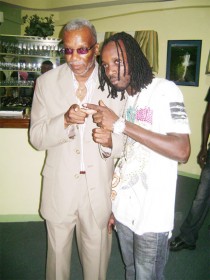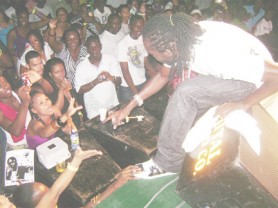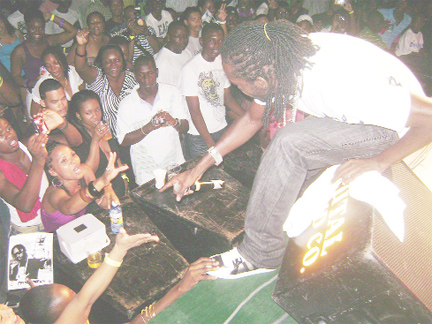The Mavado controversy is not the first of its kind to afflict the Dance Hall industry either in Guyana or in rest of the region. Popular musical entertainment thrives on a lucrative niche in sex and violence, a circumstance that leads to infrequent confrontations with mainstream society. Often, the demands of the marketplace have meant that considerations of decency and good taste had to give way.

It is much the same with the American Rap culture which, like its Caribbean counterpart, idolizes sex and violence through music. That is what ‘sells’, what appeals to the marketplace; and even if you question the taste of the marketplace, one would have to accept that popular entertainment is about business not taste, about satisfying a market demand however distasteful that demand may be. Sex and violence will, in the fullness of time, give way to some other preference as the flavour of the day. Until that happens, however, the people in the entertainment industry, the promoters, the DJ’s and the musicians themselves are not about to sacrifice their cash cow on the altar of what we loosely describe as public good.
Before Mavado there was Buju Banton and Beenie Man and a host of others, all fashionable in their time and Mavado himself will eventually have to give way. What will persist for some time yet is the choice of genre……..sex and violence, those are the phenomena that fuel the industry.
Mavado is entirely correct in his assertion that Dance Hall did not invent sex and violence; it was society that did and Dance Hall has never laid any claim to being the custodian of public good. Here in Guyana and in the wider Caribbean deviant sexual behaviour and violence are major societal issues. Popular entertainment has simply borrowed, packaged and often glorified those real life stories that emerge every day from the societal themes of sex and violence. There is evidence too that the ‘marketing’ of sex and violence through the genres of Dance Hall and Rap have spawned an unwholesome, even highly dangerous mimicry that manifests itself in

What the recent Mavado controversy has done is to raise once again the issue of ‘the freedom’ of the entertainer to ply his trade, to offer what the ‘market’ demands, whatever that may be. Simultaneously, it raises the question of the right of the state to intervene, to place limits on that ‘freedom,’ to assert what it believes is its right to perform the function of custodian of moral standards and public order.
The decision to impose a ban on Mavado, in the first place, arose out of just such a circumstance. His lyrics were deemed tasteless, unacceptably explicit and – at least so it seemed to many – tending towards the glorification of violence. The state acted because it felt it had a duty to intervene in the interest of public good.
Movado’s own very recent ‘take’ on his music and his being banned – the essence of it, that is – was that the people in the business of providing this particular genre of entertainment cannot be accused of trivializing sex and either inciting or glorifying violence nor can they be blamed for the consequences of emulation by their audiences of what they propagate on stage. People, after all, have their own minds to make up and the fare of sex and the violence, apart from being what the fans want simply mirrors the contemporary goings-on in the society. That, in a nutshell is the Mavado ‘take’ on the issue.
It is an unacceptable, even irresponsible view. Mind you, no one is suggesting that Mavado is himself a violent person, given to reckless sexual practices. He does not, he says, subscribe to the notion that his audiences should emulate the messages in his lyrics though he will be hard-pressed to prove that Dance Hall events do not provide fertile ground for reckless sexual exploits and instances of violence and that lyrics such as his are not interpreted by sections of his audiences as glorification of those practices. In effect, his brusque dismissal of questions raised about the issue during his recent visit here suggests that he may well lack a full understanding of the power of his impact as a social commentator. That raises a worrisome dilemma.
The fact that the culture of the popular entertainment allows for the embracing of smut and violence as part of the standard fare is itself an issue worthy of the most serious consideration; and whatever Mavado’s views, when idolized entertainers serve up lyrics that proffer a gung ho attitude to sex and the seeming glorification of the culture of the gun and the gangsta the young, impressionable minds that are mostly targeted by these messages can and in many instances, do take them seriously.

We may not have done any studies that seek to determine whether or not there is a nexus between popular entertainment and deviant behavior in Guyana. On the other hand there is more than sufficient evidence of links between sex, drugs and violence and some of America’s rap artistes; and here in the Caribbean we have seen the emulation of the Dance Hall culture particular in patterns of dress and in the sub-culture of mini bus entertainment.
In effect, we have un-banned an unrepentant Mavado, More than that, we have un-banned a Mavado who is still altogether prepared to make the case for sex and violence as part of the Dance Hall genre. The real question that arises is not whether or not we should have done so but whether or not we may be, in so doing, acknowledging the considerable clout of that genre of entertainment and our powerlessness to do anything about it.
What makes the Dance Hall entertainer a potent force with his audiences social commentator – apart from what in many cases is an unquestionable musical talent – is the fact that, in so many cases, their music mirrors lives that they have lived. Dance Hall and its throngs of ordinary followers are kindred spirits; the music targets the millions in the proverbial ghetto in much the same way that Rap targets the Hood; and numbered among those throngs are the impressionable, the multitude of what the Jamaican writer Orlando described as The Children Of Sysiphus. Dance Hall provides a mirror in which they can see themselves, a perspective that romanticizes their circumstances, that legitimizes their seamy social condition. There is, in other words, a kind of street credibility to Dance Hall music that renders its proponents both highly influential and highly effective as social commentators. It is much the same with the Rappers whose pursuit of the popularization of ‘The Hood’ has also been highly successful.
Mavado’s defence of the Dance Hall genre was both easy and predictable. He could not, after all, have been expected to ‘dis’ what, apart from being part of mainstream entertainment culture, is, in fact, a lucrative economic tool, to wit, his own bread and butter. To do otherwise would be a profound contradiction. What he said to the media here recently amounted to no more than a rational justification for what he does. Mavado is a businessman with a saleable product and he could not have been expected to do any different; except, perhaps, to have kept his mouth shut on the issue.
Mavado’s ‘triumphant’ return to Guyana by popular demand, his un-banning, that is, illustrates the fact that popular entertainment culture, driven as it is by strong economic imperatives has acquired a powerful lobby that allows for selective justification of what is right and what is not. In this particular instance it appears that concerns over the ‘corrupting’ influence of his lyrics – which was the justification for the original ban – gave way to the strength of the entertainment lobby, the growing influence of promoter pressure, even with the state. Movado will make money, the promoters will make money and the market demand will we met. Moral judgment, a ruling on what is in the public interest and what is not will have to be made at a less sensitive juncture. It is, after all after all, bout business……..and politics.
The problem is that point may well have long been reached where tough choices need to be made. Can we really say for sure that there is no nexus between the Dance Hall entertainment culture and the proliferation of deviant and dangerous social trends? Dance Hall, after all, has thrived side by side with tendencies towards a worrisome embracing of deviant sexual behavior, horrific episodes of violence and the popularization of the gun.
Arguments have been made for the creation of an entertainment standards czar charged with creating paradigms of acceptability since – at least so the argument goes – we need no further evidence that there are facets the Dance Hall culture that do our society far more harm than good. Mimicry in tasteless dress, crude social behavior, lewdness, drug use and abuse and deviant sexual behavior, all vices that unquestionably impact on the quality of society have become some of the spin offs of the popular entertainment culture. The problem is, of course, that there are huge risks involved in allowing the state carte blanche to stand as a sentinel at the gateway of popular entertainment. Governments often have a perplexing way of applying inflated interpretations to their mandates and those interpretations sometimes manifest themselves in levels of excessiveness that often render bad situations far worse. Can we really risk having the state as Gatekeeper?
On the other hand that situation clearly warrants some sort of decisive intervention, the creation of an understanding of what is acceptable and what is not, what militates against decency and good ord4er and what does not. After all, we have witnessed the emergence of an entertainment culture which, at the very least, aggressively propagates those very tendencies which, as a society, we seek to eradicate.
Here, several issues arise. First, is the state itself prepared to recognize that however popular a particular genre of entertainment might be, in circumstances where its proliferation threatens the fabric of the society in one way or another, inaction on the part of the authorities is not an option. Allied to that is the issue of whether the state is sufficiently seized of a sense of its responsibility to risk the ire of the entire entertainment industry and its considerable and still growing following.
And what about if we simply embrace the Mavado view – that popular entertainment is just what it is – entertainment – and that blame cannot be placed at the door of the industry or the particular genre of music if fans were to find illicit sex and violence to their liking. That, in the strictest sense of the word is, of course, entirely untrue and even if that were not the case we need, at the very least, to be vigilant about popular entertainment and its impact on our society, particularly the various ways in which it impacts on young people and influences their behavior.
Sorry little if anything has been done over the years to address the patently obvious targeting of school-aged children, particularly schoolgirls by popular entertainment events, through the very media houses that otherwise preach messages of acceptable social habits and responsible behavior. Without generalizing about the issue it is entirely fair to say that there are aspects of the contemporary ‘entertainment’ culture that are driven by offer, alcohol drugs and sex as their standard fare and that, often, some the consequences, intended or otherwise, include gun-related crimes, violence against women, reckless sex, unwanted pregnancies and socially transmitted diseases. Here, unquestionably, is an example of popular entertainment working completely at cross purposes with the efforts of the legal system, the security system and myriad dedicated individuals and NGO’s across the country. The question is whether these two sets of forces sit comfortably beside each other or whether their mutual coexistence does not amount to a circumstance of inexplicable and irreconcilable folly.
Efforts by the popular entertainment industry to expand its market among the young and the impressionable are evidenced in the appearance of Dance Hall music even at events that are planned strictly for schools, like the annual Schools Sports which, these days, frequently include a diet of Dance Hall music. Then there are those entertainment offerings known as School Uniform Parties, events that encourage revelers to desecrate school uniforms by using them as party dress. School Uniform Parties amount to a none too covert targeting of school-aged children, particularly girls, the obvious suggestion being that adult entertainment is ‘OK’ for schoolgirls, except of course that these are no ice cream and cake occasions. Oddly enough, the Ministry of Education has, up until now, not seen it fit to set its face against this phenomenon by, at the very least, publicly voicing its concern over the fact that school uniforms have become acceptable entertainment wear.
The risks that inhere in ignoring the contradictions, in regarding negative trends in popular entertainment as a passing phase are considerable. The available evidence already suggests that consumers of popular entertainment are not simply passive recipients of messages that come and go. We must decide – and the sooner the better- whether or not the Mavado ‘take’ is anywhere near what we wish to embrace or whether the popular Jamaican entertainer is not simply doing no more than singing for his own supper while not bothering too much about whether or not there are places at the table for the rest of us.

